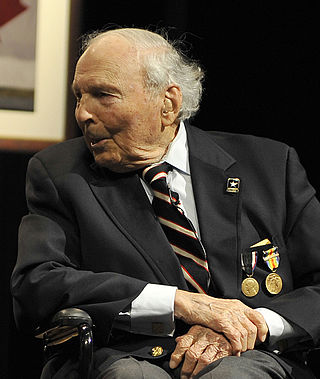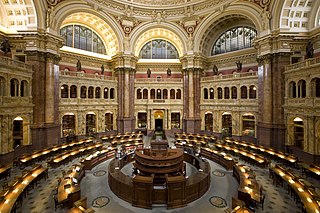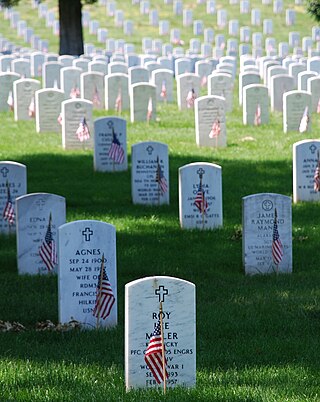Related Research Articles

The NAMES Project AIDS Memorial Quilt, often abbreviated to AIDS Memorial Quilt or AIDS Quilt, is a memorial to celebrate the lives of people who have died of AIDS-related causes. Weighing an estimated 54 tons, it is the largest piece of community folk art in the world as of 2020. It was conceived in 1985, during the early years of the AIDS pandemic, when social stigma prevented many AIDS victims from receiving funerals. It has been displayed on the Mall in Washington, D.C., several times. In 2020, it returned to the AIDS Memorial in San Francisco, and can also be seen virtually.

James Hadley Billington was an American academic and author who taught history at Harvard and Princeton before serving for 42 years as CEO of four federal cultural institutions. He served as the 13th Librarian of Congress after being nominated by President Ronald Reagan in 1987, and his appointment was approved unanimously by the U.S. Senate. He retired as Librarian on September 30, 2015.

The American Folklife Center at the Library of Congress in Washington, D.C. was created by Congress in 1976 "to preserve and present American Folklife". The center includes the Archive of Folk Culture, established at the library in 1928 as a repository for American folk music. The center and its collections have grown to encompass all aspects of folklore and folklife worldwide.

Paradise Valley is a census-designated place (CDP) in Humboldt County, Nevada, United States, near the Santa Rosa Ranger District of Humboldt National Forest. It is located at the northern terminus of Nevada State Route 290, about 19 miles (31 km) northeast of U.S. Highway 95 and a total of 40 miles (64 km) north of Winnemucca. The town is located in a broad valley, with the Santa Rosa Range of mountains just to the northwest. At the 2010 census, the population of the CDP was 109.

Martin L. Fackler (1933–2015) was an American military officer, surgeon and wound ballistics expert. He served in the U.S Navy from 1960 to 1975 and in the U.S. Army from 1975 to 1991. He was a field surgeon at the Naval Support Hospitals at Da Nang, Vietnam and at Yokosuka, Japan, and later a colonel in the US Army's Medical Corps. He was the founder and head of the Wound Ballistics Laboratory for the Letterman Army Institute of Research from 1981 to 1991. He was a member and leader of numerous distinguished organizations, among them the International Wound Ballistics Association, the French Wound Ballistics Society and the American Academy of Forensic Sciences. Dr. Fackler had numerous teaching appointments and was the author of over 300 publications in regards to wound ballistics, body armor, and treatment of injuries for both the military and civilian populations. He is credited with a number of contributions to the field of terminal ballistics, including:
The Sophia Smith Collection at Smith College is an internationally recognized repository of manuscripts, photographs, periodicals and other primary sources in women's history.

Frank Woodruff Buckles was a United States Army corporal and the last surviving American military veteran of World War I. He enlisted in the U.S. Army in 1917 aged 16 and served with a detachment from Fort Riley, driving ambulances and motorcycles near the front lines in Europe.
Lloyd Brown was one of the last surviving American veterans of the First World War and also the last member of the United States Navy to have signed up before the German armistice. Born in Lutie, Missouri, Brown enlisted at age 16, and served as a Seaman Second Class aboard the USS New Hampshire. He was discharged in 1919, but reenlisted in 1921, and served as a Musician 2nd Class. He was discharged in 1925. After his service, he worked at a Washington, D.C. firefighter company covering the White House and foreign embassies.

The Library of Congress (LOC) is a research library in Washington, D.C., that serves as the library and research service of the U.S. Congress and the de facto national library of the United States. Founded in 1800, the library is the United States's oldest federal cultural institution. The library is housed in three elaborate buildings on Capitol Hill. It also maintains a conservation center in Culpeper, Virginia. The library's functions are overseen by the Librarian of Congress, and its buildings are maintained by the Architect of the Capitol. The Library of Congress is one of the largest libraries in the world. Its collections contain approximately 173 million items, and it has more than 3,000 employees. Its collections are "universal, not limited by subject, format, or national boundary, and include research materials from all parts of the world and in more than 470 languages".
Robley Henry Rex was a World War I-era veteran and was, at the age of 107, one of two remaining U.S. veterans related to the First World War.

Arlington Farms was a temporary housing complex for female civil servants and service members during World War II. Built in 1942–1943 by the United States Government's Federal Works Agency (FWA), Arlington Farms was located on the former site of the United States Department of Agriculture's Arlington Experimental Farm on the grounds of the historic 1,100-acre Custis-Lee family estate in Arlington County, Virginia, outside Washington, D.C.

The Samuel Proctor Oral History Program (SPOHP) is the official oral history program at the University of Florida. With over 6,500 interviews and more than 150,000 pages of transcribed material, it is one of the premier oral history programs in the United States. SPOHP's mission is "to gather, preserve, and promote living histories of individuals from all walks of life." The program involves staff, undergraduate and graduate students, and community volunteers in its operation.

The commemoration of the American Civil War is based on the memories of the Civil War that Americans have shaped according to their political, social and cultural circumstances and needs, starting with the Gettysburg Address and the dedication of the Gettysburg cemetery in 1863. Confederates, both veterans and women, were especially active in forging the myth of the Lost Cause of the Confederacy.

Jay Winik is a New York Times best-selling author and American historian who is best known for his book April 1865: The Month That Saved America.

Virginia C. Claudon Allen is an American former radio personality who was a civilian employee for Army Intelligence and an American Red Cross volunteer stationed in India during World War II. She hosted a nightly radio program to counter-act the broadcasts of Tokyo Rose. Like Martha Wilkerson's GI Jive show, U.S. military and civilian officials viewed broadcasts such as Allen's for the Armed Forces Radio Service as an essential support for troop morale.
Veterans Heritage Project (VHP) is a nonprofit organization based in Phoenix, Arizona whose mission is to "Connect Students with Veterans™ in order to Honor Veterans, Preserve America's Heritage and Develop Future Leaders."
Melvin Joel Zabarsky (1932–2019) was an American figurative painter who created representational work in the narrative tradition. Known for a bright, bold palette, his work often explores political, historical and cultural themes to surreal and realist effect. In a six-decade career marked by several distinct phases, Zabarsky's imaginative use of color, formal experimentation and commitment to narrative organization in both traditional and avant garde styles are hallmarks of his work. In an interview with the British philosophers Donald and Monica Skilling, he said, "I'm discovering history, or a narrative, within a painting, as I go along."

The Disability Visibility Project (DVP) is an online community dedicated to creating, recording, sharing, and amplifying disability media, stories, and culture. DVP is a community partnership with StoryCorps, an American oral history organization dedicated to preserving and sharing stories through interviews. Interviews recorded with StoryCorps are archived at the American Folklife Center at the Library of Congress with the permission of the interviewer. The DVP platform consists mainly of blog posts and podcast episodes, but also creates disabled media from collected oral histories in the form of tweets, radio stories, audio clips, images, etc.

Curtis Christopher Robinson was an American pharmacist and U.S. Army Air Force officer. He served as a fighter pilot during World War II with the 332nd Fighter Group's 99th Fighter Squadron, a component of the Tuskegee Airmen.
Murray Seeman was an American lawyer and real estate developer on Long Island, New York. He was known for his contributions to the community as Mayor of Great Neck Estates, as a World War II veteran and a Biblical scholar.
References
- ↑ "The American Folklife Center at the Library of Congress". www.LOC.gov. hdl:loc.afc/folklife.home . Retrieved January 21, 2020.
- ↑ "About the Veterans History Project (American Folklife Center)". Loc.gov. Retrieved 2010-03-25.
- ↑ "Veterans History Project >> Representative Joe Sestak". Sestak.house.gov. 2000-10-27. Retrieved 2010-03-25.
- ↑ "The D'Azzo Research Library Newsletter". Afit.edu. 2000-10-27. Retrieved 2010-03-25.
- ↑ Chris Coutu (2000-10-27). "Make A Difference, Support American Veterans & Troops, Now!". American Warrior.Us. Retrieved 2010-03-25.
- ↑ "How did the Veterans History Project start?". Ask.com. Archived from the original on 2010-01-22. Retrieved 2010-03-25.
- ↑ Springer, Jason. "Training for the Veterans History Project". Blue Jersey. Archived from the original on 2012-02-20. Retrieved 2010-03-25.
- ↑ "Central Connecticut State University Veterans History Project: FAQ". 2000-10-27. Archived from the original on 2011-09-27. Retrieved 2010-03-25.
- ↑ "Representative Kenny Marchant: Learn About The Veterans History Project". Archived from the original on 2010-02-04. Retrieved 2010-03-25.
- ↑ "INTEGRIS Third Age Life Senior Services: Veteran's History Project". Integris-health.com. 2000-10-27. Retrieved 2010-03-25.
- ↑ "History: Commemorating The Men And Women Who Have Served In Our Armed Forces". Archived from the original on 2011-07-25. Retrieved 2024-04-11.
- ↑ "Veterans History Project". Norcaltrav.com. 2000-10-27. Retrieved 2010-03-25.
- ↑ "Veterans History Project". NPR.org.
- ↑ "Robert Patrick Named Director of Veterans History Project". Library of Congress. Retrieved 28 September 2019.
- ↑ "New Director Appointed to Lead Veterans History Project". Library of Congress. 4 November 2016. Retrieved 28 September 2019.
- 1 2 "VHP Celebrates Women's History Month with Film Series "Women at War"". Library of Congress . Retrieved 22 December 2010.
- ↑ "Movie Review: Ladies Courageous". The New York Times. 1944.
- ↑ The Library of Congress (October 1, 2007). "Veterans History Project Web Site Enhances Experience of "The War"". News From the Library of Congress.
- ↑ The Library of Congress (November 6, 2008). "Veterans History Project Spotlights Stories of WWII 92nd Infantry Division: Soldiers from WWII African American Unit Recount History in Their Own Words". News From the Library of Congress.
- ↑ "Veterans History Project Marks Tenth Year with Events and Initiatives". Library of Congress. Retrieved 2021-01-03.
- ↑ "Veterans History Project 10th Anniversary". Library of Congress. Retrieved 2021-01-03.
- ↑ "VHP Celebrates 15th Anniversary With New Web Presentation". Library of Congress. Retrieved 2021-01-03.
- ↑ "Veterans History Project Celebrates 20th Anniversary Year with Online Concerts, Panels, Nov. 6-14". Library of Congress. Retrieved 2020-11-24.
- ↑ "Library of Congress Veterans History Project virtual concert". www.radio.com. 2020-11-03. Retrieved 2020-11-24.
![]() This article incorporates public domain material from "About the Veterans History Project". American Folklife Center. Library of Congress.
This article incorporates public domain material from "About the Veterans History Project". American Folklife Center. Library of Congress.